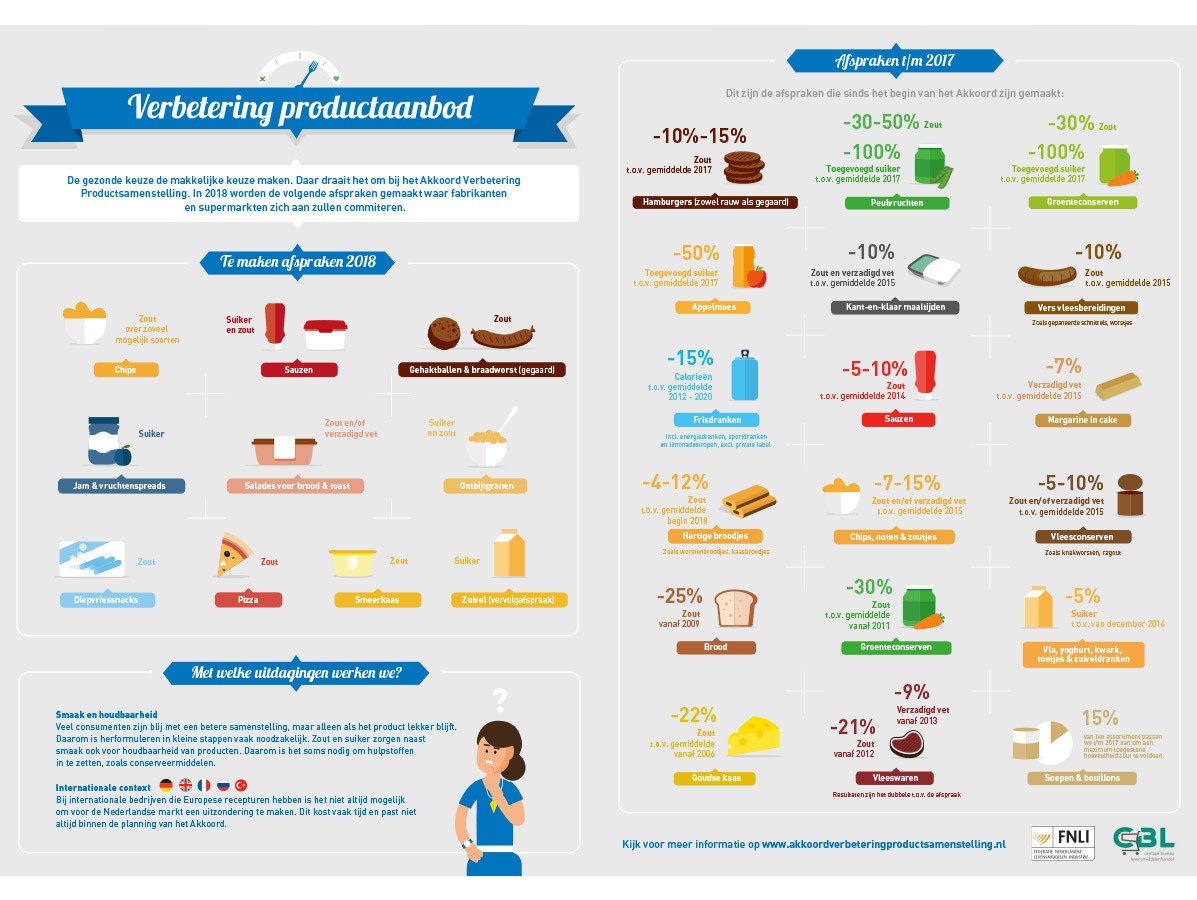
Every year - in the National Agreement to Improve Product Composition - agreements are made between the food and beverage industry and the supermarkets about the reduction of sugars, salt, and saturated fats. A recent overview shows that many products have become healthier over the period 2013-2017.
Some of the products that are showing excellent results are, for example, summer vegetables and apple sauce. Various brands of apple sauce now contain less sugar, and canned and potted summer vegetables such as broccoli or endive now contain no added sugar at all. Hamburgers, both raw and precooked, contain at least 10% less salt. And ready-made meals, sausage rolls, crisps, bread, meat products, and cheese also contain considerably less salt. The industry is still working on reducing salt in pizzas and on the sugar reduction in dairy and salads, such as salad spreads for bread and hummus. Sauces are also under review. And for 2018, agreements have been made for savoury bread snacks, cheese spread, breakfast cereals, and savoury frozen snacks.
In addition to the guidelines of the National Agreement to Improve Product Composition, manufacturers and supermarkets are working actively on the redefinition of their products. By working together in this agreement, it becomes easier for companies to make individual steps as well. Marc Jansen, Director of the CBL (Dutch Food Retail Organisation), finds the attention for healthy food very important. "At the moment, we work on three new agreements. They will affect the entire range of products." The food industry is aware of its role in the daily eating pattern of people and fully embraces the need for a healthier supply. Marian Geluk, Director of the FNLI (Federation of the Dutch Food Industry): "With these mutual agreements to improve products, we make big steps across the entire shop shelf. I'm proud of our frontrunners who go the extra mile to achieve this. We won't stop, because we can do even better".
One of these frontrunners is HAK. They offer a new recipe standard for red cabbage with apple and beetroots. The total amounts of sugars in the new recipe now only contains the natural sugars in the beetroots, red cabbage, and apples. "It was a huge challenge for our culinary product developers to make the products just as tasty as the traditional varieties, and that without adding any sugar and salt", says Nicole Freid, Innovation & Marketing Director at HAK. "They didn't have to become exact copies, but new, 'modern' interpretations with natural ingredients, herbs, and spices such as cinnamon, onion, and lovage. Out of dozens of recipe ideas, they managed to find two that would not encourage consumers to add sugars and salt during the preparation. Because that would be putting the cart before the horse." The traditional varieties Red Cabbage with Apple and Beetroots will also remain in the assortment, says Freid. As established in the most recent covenant from 2017 between canned goods producers, HAK also significantly reduced the amounts of sugars and salt in these classics with a 20% reduction of sugars and a 40% reduction of salt.
HAK advises consumers who want to eat healthy not just to check whether a product contains added sugars, but also to look at the natural sugars. Nicole Freid: "As a manufacturer, you can say that you are no longer adding extra sugars, but when the apples you are using are very sweet and contain a lot of natural sugars, the intended health gain is partly negated. Sugar is sugar. As part of our innovation strategy, we have forced ourselves to get the amount of natural sugars to a very low percentage, while retaining the nice, slightly sweet taste. We do this by working closely with mother nature and choosing the right mix of apples". With their Apple Sauce 0%, HAK managed to achieve this by using apples with tasty, fresh and sweet taste and a low sugar content. This product contains just 9.5 grams/100 grams of natural sugar. "And that's very low for an apple sauce", says Freid.
Redefinition is one of the instruments to help consumers to eat healthier without noticing it. But a complex problem such as obesity requires a wide and integral approach. This is why the CBL and FNLI are also consulting with other social partners and the government in order to work on the Prevention Agreement.
Source: © Vakblad Voedingsindustrie 2018